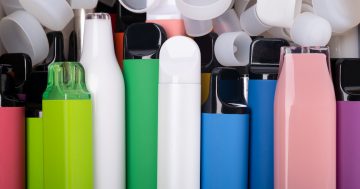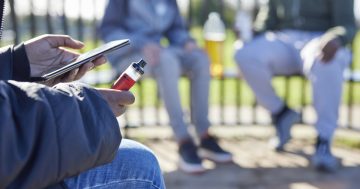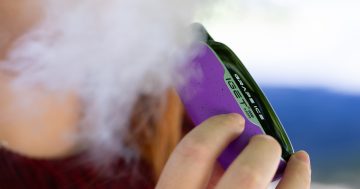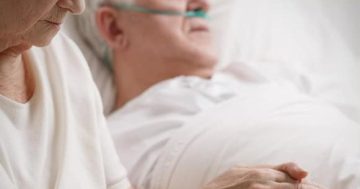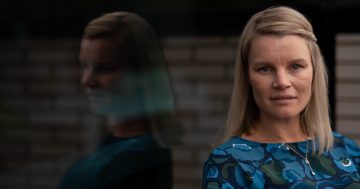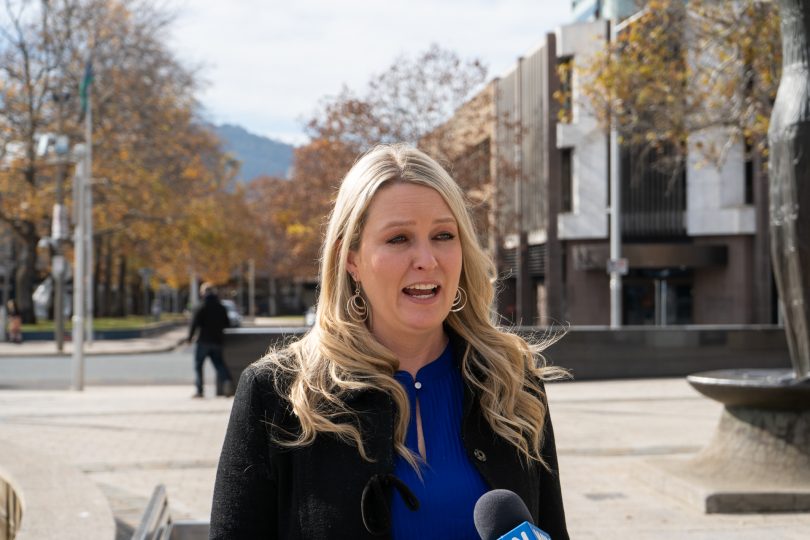
Dr Marisa Paterson has called on the government to review current laws to ensure they actively discourage the take up of vaping and e-cigarettes. Photo: Dominic Giannini.
Increasing concerns from parents about vaping and the use of e-cigarettes at schools has prompted Labor MLA Dr Marisa Paterson to push for stricter regulations and better education programs about the products.
It is currently illegal to sell vaping products to people under the age of 18, and a person needs to have a prescription to buy liquid nicotine for their vape. However, the products remain widely available in the community and can easily be bought online.
The Labor backbencher moved a motion in the Legislative Assembly on Tuesday (3 August) calling on the government to review the Territory’s legislation to ensure current laws actively work towards minimising the harm caused by e-cigarettes and vaping.
The motion also called on the government to lobby Commonwealth Ministers to update national laws extending plain packaging to non-tobacco smoking products, restricting certain e-liquid flavours to those less likely to appeal to children and young people, and child-safe packaging.
The call came after a toddler died in Melbourne in 2019 after drinking the liquid used in his mother’s vape while she was distracted.
Dr Paterson said she had been approached by community members over the last few months and was inundated by concerned parents after posting widely within the Canberra Community Noticeboards Facebook group.
This included children purchasing the products at school, she told the Legislative Assembly.
“I was quite overwhelmed by the number of people who contacted me and said this was widespread among young people in the ACT,” she said.
“We have done so well for decades on the public health messaging around cigarettes, and these products are slipping into our community and young people are normalising these smoking behaviours.
“These products have come into our community under the radar and we need to be addressing this. [Otherwise] we run a risk that we are going to end up with another generation of smokers.”
Dr Paterson said that people who use vapes could be up to three times more likely to take up smoking than people who don’t use the product.
But ACT Council of Parents and Citizens Associations’ communications officer, Janelle Kennard, told Region Media that parents’ concerns over vaping had not been brought to the association’s meetings.
“As a parent, I am aware that my kids say that vaping happens, but it has not been brought to council,” she said.
“I do not know whether it is partly that the parents that are least engaged with P&Cs are from older kids so we are less likely to hear from them. It is interesting because a lot of things that are not school issues get brought up with us, but for some reason, it just has not happened to come to us this time.”
In May, the principal of St Mary MacKillop College, Michael Lee, confirmed five students received a one-day suspension after being caught vaping on school grounds at the end of April.
One in seven Australians between the age of 12 and 17 have used e-cigarettes, according to the 2017 Australian Secondary Students’ Alcohol and Drug survey, while two-thirds of students who used an e-cigarette got it from a friend, compared to only 8 per cent who got it from a sibling and 7 per cent from parents.
One in eight students were able to buy a vape by themselves.
The survey, conducted by the Department of Health, occurs once every three years but was delayed due to the pandemic. The next one will not take place until 2022.
Dr Paterson said it was important to de-normalise the use of these smoking products and better support people with nicotine addictions without the need for vaping or e-cigarettes.
“Smoking is already considered anti-social. We need to continue to support programs such as the national Quitline to assist those in our community with a nicotine addiction,” she said.
“We need to ensure that others, particularly children and young adults, do not take it up”.
The motion passed unanimously. The government will report back to the Assembly on its progress by the first sitting week of December 2022.












